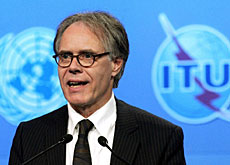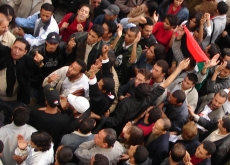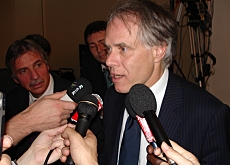Swiss have mixed reactions to info summit

Swiss participants at the World Summit on the Information Society (WSIS) say the past week has been positive but not sensational.
The creation of an internet governance forum has been largely welcomed, but the dearth of financial pledges has been criticised.
After Geneva in 2003, the second phase of the WSIS ended in Tunis on Friday with a firm promise to narrow the digital divide but little in government funding to make it happen.
“We should know by now that United Nations’ summits don’t bring immediate results,” Marc Furrer, president of the Federal Communications Commission and head of the Swiss WSIS delegation, told swissinfo.
“Substantial results are usually not possible, but I think this summit put the question of internet governance on the map.”
Negotiators from more than 100 countries had agreed on the eve of the meeting to leave the United States in charge of the internet’s addressing system, averting a US-EU showdown at the summit itself.
Instead of transferring management of the system to an international body such as the UN, an international forum would be created to address concerns. The forum however would have no binding authority.
But resentment over perceived US control persisted and participants left with few concrete pledges of financial help.
“I’m not as negative as some people,” said Furrer. “Switzerland’s aim was certainly not to get domain names under the control of a UN organisation or of governments – that would be the worst thing you could do – but I think a certain public service aspect will result from the creation of this forum.”
“For me this is positive but it’s probably not sensational.”
Wolf Ludwig, a spokesman for Swiss non-governmental organisations, told swissinfo that the summit in Tunis had resulted in only “half a solution” but agreed that the forum was “better than nothing”.
“The internet governance forum is a step in the right direction as it will enable civil society to participate,” he told swissinfo.
Empty promises
However, Ludwig had by no means universal praise for the WSIS.
“With regards to the financial mechanisms, this summit is a failure,” he said. “No governmental delegations have freed up any resources for the digital solidarity fund to benefit poor countries – and this fund is sustained on a voluntary basis.”
Diallo Mohamadou, a telecommunications consultant from Senegal, was also critical.
“They have made promises and promises and promises and it’s not the first time that they have promised this.”
“In 2000, they promised to connect all the small villages far away from the big cities in Africa to the internet. Five years later and nothing has happened.”
Next step
Furrer is cautiously optimistic that we won’t look back in five years and say this was all a waste of time. However, he was not sure whether the experience should be repeated.
“It’s good that there is coordination and monitoring and follow-up, but to have another huge summit – I just don’t know whether it’s necessary.”
Furrer hopes that telecoms exhibitions will now be more application-driven.
“They won’t just show the nicest computer or mobile phone but will demonstrate what can be done with it.”
He believes the summit has given vital impetus to this way of thinking. “This aspect of the WSIS was as important for me as the political declaration and all the talks.”
Others were more prosaic.
“The real result of WSIS is that the debate over internet governance will be prolonged for another five years,” said Milton Mueller, an internet governance expert at Syracuse University in New York.
swissinfo, Thomas Stephens
The second phase of the WSIS in Tunis ended on Friday after almost a week of intense negotiations attracting around 19,000 participants from around the world.
The summit was attended by national delegations from 174 states and participants from more than 800 entities including UN agencies, private sector companies and civil society organisations.
The summit’s aims were to tackle the problem of the “digital divide” and harness the potential of information and communication technologies (ICTs) to drive economic and social development.
WSIS was conceived to raise consciousness about the so-called digital divide between the technological haves and have-nots and to raise money for projects to link up the global village, particularly Africa and Asia and South America.
But instead it was overshadowed by a lingering sour taste about who should oversee the domain names and technical issues that allow people from Bern to Bahrain to surf websites for information, news and consumer goods.

In compliance with the JTI standards
More: SWI swissinfo.ch certified by the Journalism Trust Initiative




You can find an overview of ongoing debates with our journalists here. Please join us!
If you want to start a conversation about a topic raised in this article or want to report factual errors, email us at english@swissinfo.ch.